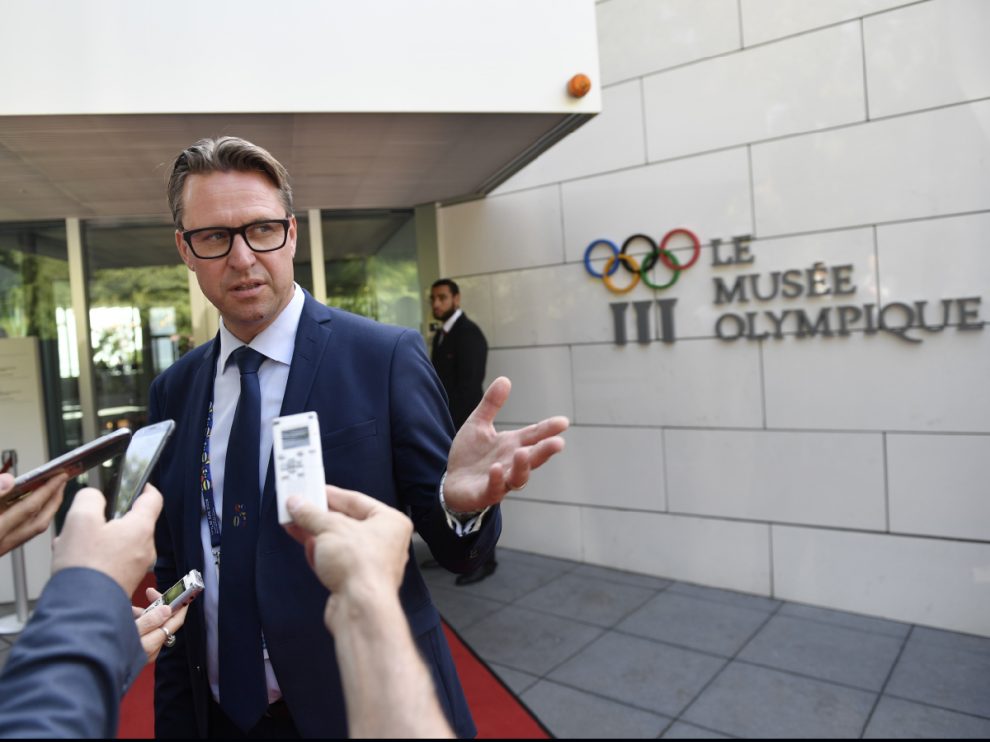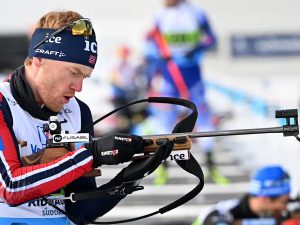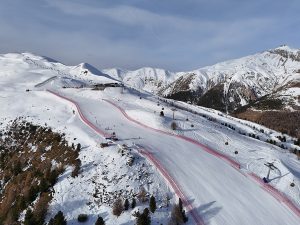di Laura Cazzaniga: Presidenza Fis: Mats Årjes, manager svedese: “Mi manda Jonas Nilsson”
Mats Arjes è uno dei quattro candidati alla Presidenza Fis, elezioni previste il 4 giugno, in corsa per sostituire Gian-Franco Kasper . Rispetto a Urs Lehmann, Johan Eliash e Sarah Lewis è forse il personaggio meno noto alle cronache nel nostro paese. Ma nel Nord Europa è sicuramente riconosciuto tra i più importanti manager del settore neve. Dunque scopriamo chi è attraverso un’intervista realizzata naturalmente a distanza. Che però non si è vista per la naturalezza e la spontaneità con la quale Mats si è rivolto a noi.
Nato a Stoccolma nel 1967 Mats Årjes ha un background decisamente di spicco. Ha ricoperto il ruolo di Presidente, amministratore delegato e membro del consiglio di amministrazione di SkiStar AB, società che controlla le cinque principali stazioni della Scandinavia, Åre in testa.
Dal 2003 è anche membro del consiglio di amministrazione di New Wave Group AB (prodotti e oggettistica per la casa). Dal 1998 al 2002 è stato Segretario Generale, rispettivamente dal 2008 al 2018 come Presidente della federazione Sci Svedese. Nel 2018 è stato eletto Presidente del Comitato Olimpico del suo paese.
È entrato a far parte del Consiglio FIS nel 2010 e successivamente è stato nominato Vicepresidente del Consiglio. Nel 2018 è diventato anche Tesoriere della FIS e Presidente della Commissione finanziaria. Tra le altre cose, il 20 aprile scorso, è stato riconfermato per altri 4 anni come membro del consiglio.
I ruoli rivestiti da Mats Årjes sono veramente molteplici, sempre legati al mondo dello sport, spaziando da quella che è una figura legata al business a quella di rappresentanza.
Sposato con Kirstine, ha due figli, August di 25 anni e Carl di 27 anni.. “Non più così piccoli effettivamente. Io però li vedo sempre come i miei piccoli”.
Nella tua famiglia sciano tutti?
Anche se non è scontato, nel mio caso sì. Mia moglie predilige però lo sci di fondo allo sci alpino. Per i miei figli, invece, ho sempre dato loro l’opportunità di avere un’alternativa. Per questo motivo sono anche interessati ad altri sport. Niente gare però, se non quando erano veramente piccoli. Tra l’altro devo anche dire che è curioso parlare con te che sei italiana, dal momento che mio figlio più grande, è sua volta legato a una ragazza che viene da Torino. Ora vivono a Leksand, un piccolo paesino di montagna nel nord di Stoccolma e hanno avuto una Stella, una bellissima bimba bionda di due anni.
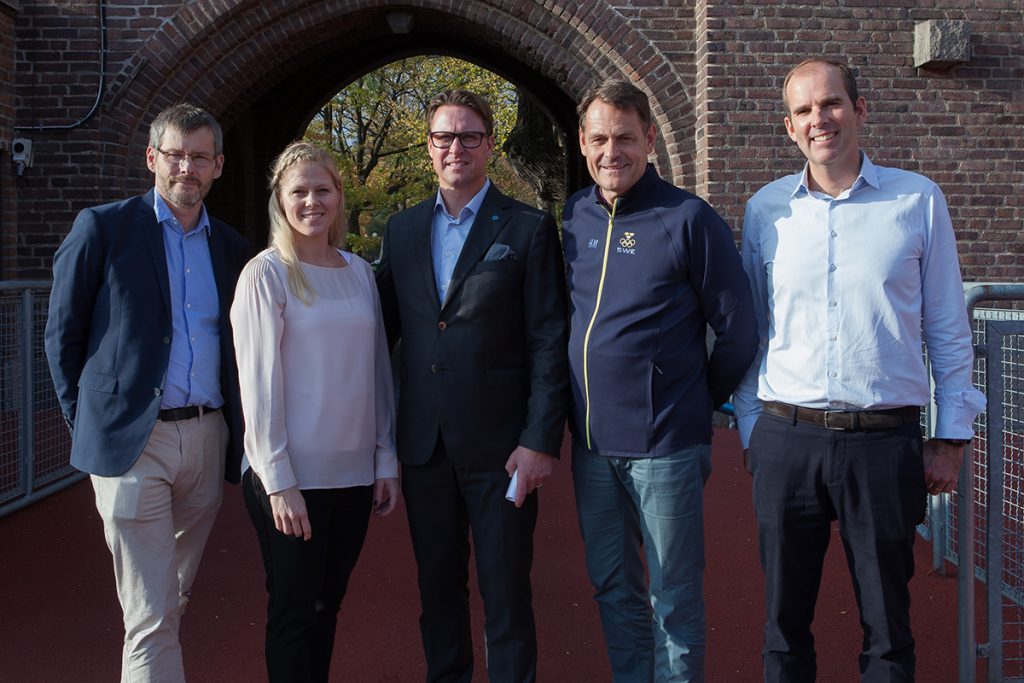
Il team del comitato creato per la candidatura delle Olimpiadi 2026 andate poi a Milano Cortina. Da sinistra, Johan Strid, (ex segretrario generale del Comitato paralimpico svedese), Jessica Lindell Vikarby, ex atleta di Coppa del Mondo, Mats Årjes (qui in veste di Presidente del comitato olimpico svedese), Peter Reinebo, CEO del Comitato olimpico svedese), Rikard Brisius, CEO del comitato candidatura olimpico Stoccolma-Åre 2026.
August e Carl seguiranno le orme paterne?
Sono cresciuti nello sport quindi mi piacerebbe che venissero coinvolti in varie organizzazioni legate alle loro passioni.
Ora veniamo a te. Sei uno sciatore?
Da bambino ero certamente appassionato di sci ma praticavo tanti sport. A 15 anni la decisione di dare priorità allo sci alpino. Fino ad allora, invece, ero molto appassionato di hockey su ghiaccio. Mentre sciavo, sono stato anche chiamato dalla squadra Svedese per i risultati che avevo ottenuto. Ma dopo due anni ho avuto un infortunio alle ginocchia. E, sai come vanno le cose in questi casi… un intervento chirurgico via l’altro che mi hanno costretto a fermarmi per lunghi periodi durante gli allenamenti e le gare. Questo mi ha fatto capire che non sarei diventato un campione! Inevitabile il ritiro. Ricordo come fosse ieri, ero triste perché la situazione suonava come una sconfitta. La voglia di mettermi in gioco era ancora molto alta ma ho dovuto arrendermi. Così a 20 anni mi sono buttato nello studio, iscrivendomi all’università di economia e management, fino a ottenere un master in “Science in Business Administration and Economics”.
Tra lo sci e l’hockey quale ti ha dato maggiori soddisfazioni?
In inverno ancora oggi ne approfitto appena posso per fare una bella sciata. In generale questo è il mio sport. Amo però ogni genere di attività: Il paddle, lo sci di fondo, la bicicletta… Logicamente ogni sport ha la sua stagione e quest’anno, nonostante la neve abbondante, sto già pensando agli sport estivi. Avrei però bisogno di rimettere gli sci ancora una volta prima dell’estate.
La passione per lo sci ti è stata trasmessa dai tuoi genitori?
Bella domanda… sinceramente no. I miei genitori non sono mai stati dei veri e propri sciatori. Mio padre amava soprattutto l’hockey su ghiaccio, ed è per questo che anch’io sono sceso sul ghiaccio. Normale per il nostro piccolo paese (15mila abitanti) dove questo sport è molto famoso. Papà, Christian, ha fatto parte addirittura della squadra nazionale. A 15 anni però mi sono fatto rapire dallo sci e non mi sono mai pentito di questa scelta. Infatti, lo sci, oltre a essere una passione, mi ha aperto anche molto porte dal punto di vista lavorativo.
Che tipo di opportunità?
Innanzitutto a fine 1992, con mio cognato, che ha quattro anni in più di me che sono del 1967, abbiamo deciso di rilevare una piccola stazione sciistica che abbiamo gestito insieme per tre anni.
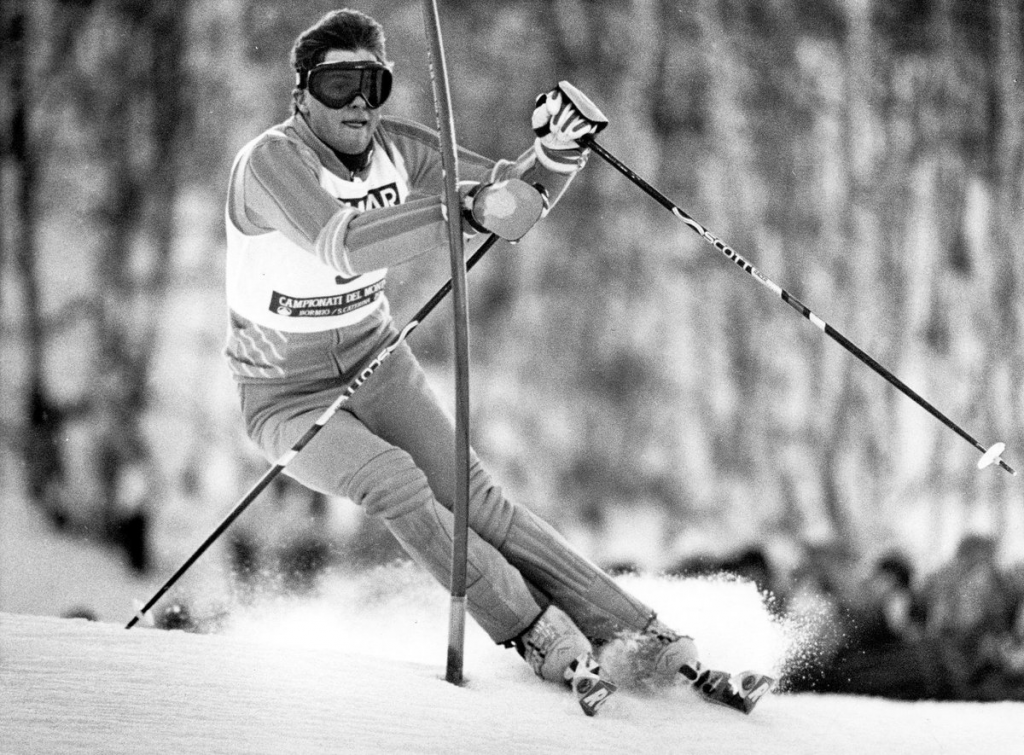
Jonas Nilsson medaglia d’oro nello slalom dei Mondiali di Bormio ’85. È cognato di Mats
Un manager anche lui?
Eh, ma quando ti dico chi è… Ricordi Jonas Nilsson, lo slalomista campione del Mondo di Salom nel 1985 a Bornio? Proprio lui. Jonas, ha proseguito la sua carriera fino alle Olimpiadi del 1992, poi abbiamo fatto squadra rilevando quella piccola stazione sciistica. Dopo quattro anni, invece, mi è stato chiesto di diventare direttore generale delle Associazione Svedese di sci e lo sono diventato nel 1998, mantenendo questo ruolo per altri quattro anni. Successivamente, nel 2002 sono diventato CEO della SkiStar, una società per azioni quotata alla borsa di Stoccolma. L’ho gestita per 17 anni, fino al 2019.
Quale tra tutti questi ruoli ti ha regalato più emozioni?
Per me è stato un privilegio essere il CEO di Ski Star. Mi ha totalmente temprato e insegnato molto anche nell’ottica del mio ruolo nel consiglio FIS. Però, da quando sono diventato presidente del comitato olimpico ho dovuto lasciare l’azienda, nel maggio del 2019, anche se poi ho dato alcune direttive per un buon passaggio di testimone fino a novembre dello stesso anno. La scelta l’ho presa anche per evitare conflitti di interessi. Amo il mio lavoro ma sono sempre perfettamente in grado di capire quali sono i miei limiti. Questo mi permette di assorbire nuovi input di miglioramento.
La gestione di questa azienda è correlata alla scelta di candidarti alla presidenza FIS?
Questa è veramente un’ottima domanda. Il motivo principale per cui ho scelto di candidarmi è il background che mi sono costruito in questi anni, che penso sia di una certa rilevanza. Nella vita, mi sono occupato infatti sia di sport che di business. Per la precisione di business nello sci se si pensa all’azienda SkiStar, appunto. E qui mi ricollego alla tua domanda. SKISTAR è una società che possiede cinque stazioni sciistiche in Scandinavia con un grande valore di mercato (Are, Sälen, Vemdalen, Trysil Hemsedal, più St. Johann in Tirol e Hammarbybacken). Questo la porta in questo settore a essere la più grande in Europa. Un’azienda che mi ha dato modo di unire gli obiettivi che avrei voluto raggiungere nel potenziamento di varie associazioni per cui già lavoravo al mero business. Tutto questo ritengo debba sempre esserci anche nella Fis.
Il presidente uscente è Gian-Franco Kasper, nel caso in cui venissi eletto presidente ci sono elementi che vorresti mantenere e altri che vorresti cambiare per la tua idea della FIS nel futuro?
Bene, quanti giorni abbiamo per quest’intervista? … No, seriamente. Ci sono molti aspetti positivi ma, esattamente come per le aziende, ci sono sempre cose che possono essere migliorate e su cui bisogna lavorare. La FIS è sicuramente la federazione che incide maggiormente negli sport invernali, rappresentando circa il 50% tra la totalità delle medaglie olimpiche invernali. Sulla base di questi numeri, credo sia importante rappresentare questa leadership anche dal punto di vista organizzativo.
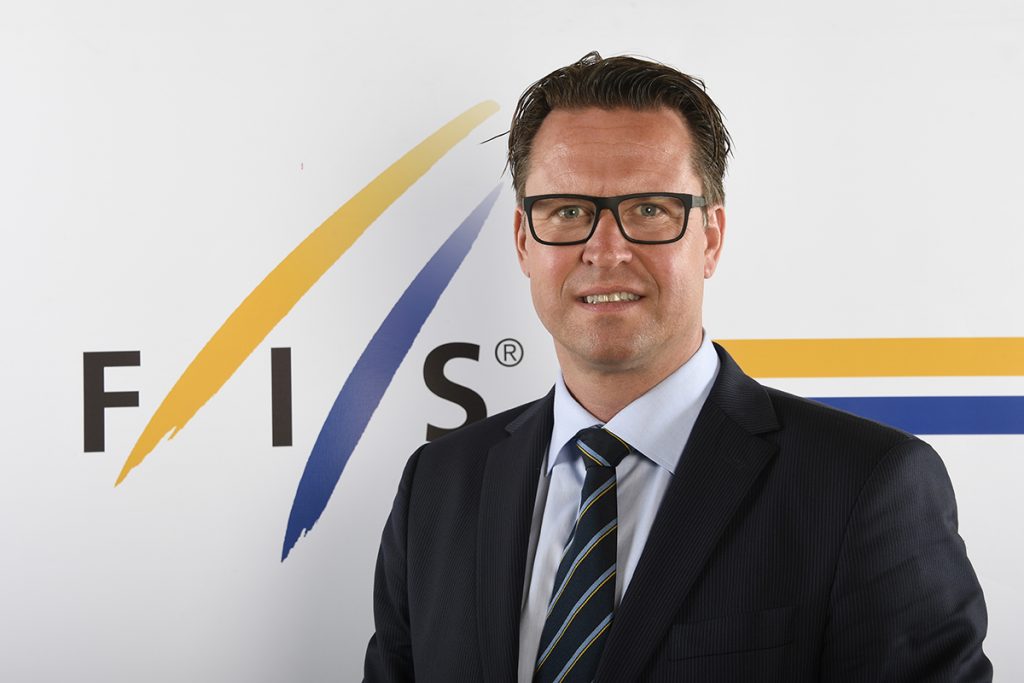
Per questo, si lavora sulle singole discipline in maniera eguale, nell’ottica di ottenere sempre nuovi successi. Non credo perciò che sia corretto esporre dichiarazioni controverse verso la FIS attuale, perché è tutto un continuum che dipende dalle situazioni e dalle evoluzioni.
Inoltre, la FIS, oltre a colui che riveste la carica presidenziale, è composta da un team di esperti e professionisti e da un consiglio. Questi elementi sono il fuoco della federazione e costituiscono un organo decisionale. Lavorare per una federazione così di spessore, significa condividere e lavorare insieme, quindi non mi sento di esprimere un mio parere, ma di costruire e migliorare, se fossi presidente, facendo leva sul supporto di tecnici specializzati, che lavora insieme verso un unico obiettivo, e questa è una cosa che ci tengo a sottolineare.
Ecco, sicuramente, l’obiettivo finale deve comunque sempre rimanere il miglioramento, per quello che rappresentiamo, uno sport e una passione.
Su questo non ho proprio nulla da ridire, essendo parte del consiglio da anni, ho visto da vicino gli sviluppi che vi sono stati nella FIS. Qualche cambiamento verrà fatto, le situazioni evolvono.
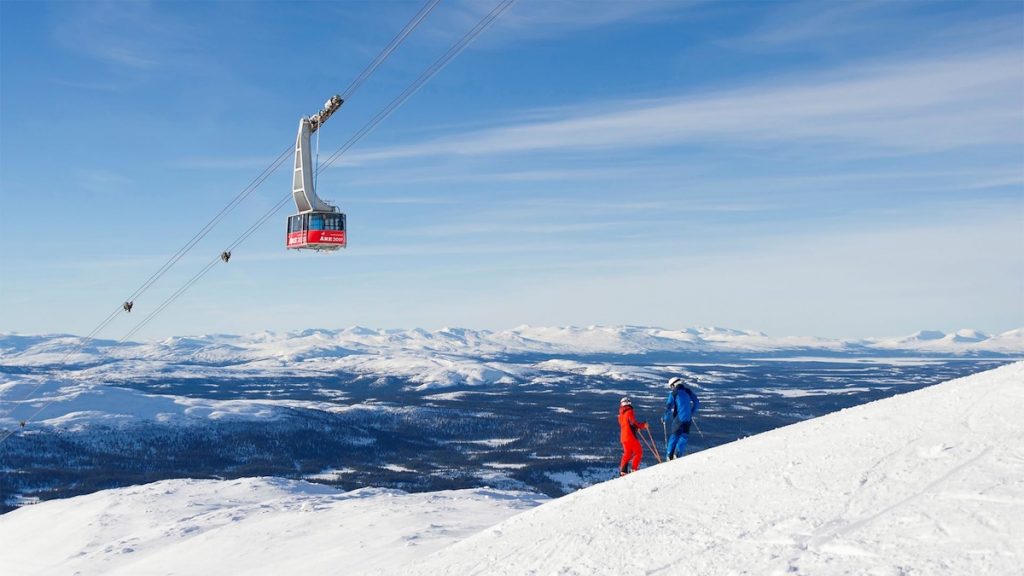
Un grande punto all’ordine del giorno è in numero crescente degli incidenti sugli sci. Cosa ne pensi?
Sicuramente questo è un dei punti di maggior rilevanza che la FIS sta trattando, già da anni, per trovare una soluzione tangibile al problema.
Non è infatti accettabile che lo sci venga inserito tra gli sport pericolosi con incidenti oltre la media stimata. Abbiamo già preventivato un programma su come evitare, o almeno ridurre, il numero degli incidenti e degli infortunati per l’intero settore. Per le gare, ma non solo, anche a vantaggio del turismo e della possibilità di incentivare il settore montano con nuovi possibili sciatori.
Anzi, ti ringrazio per aver sollevato questa questione che mi sta molto a cuore e ritengo sia molto importante per il risvolti futuri della FIS.
Hai la soluzione in tasca?
Ho partecipato a diversi incontri su questo tema, ma non sono io la parte responsabile di questo aspetto perché ci sono esperti che la curano nel dettaglio. Se dovessi diventare presidente, mi assicurerò di avere una squadra dedicata e qualificata per far sì che le cose vadano fatte come devono essere fatte.
E cosa pensi della parte ci comunicazione della FIS?
Ti girerei la domanda. Tu cosa ne pensi? Vedi, per capire su cosa migliorare la comunicazione bisogna verificare il parere della gente che vive il nostro mondo.
Dopo vari scambi di opinioni si è arrivati alla conclusione che…
Per promuovere lo sport, la passione e le gare, non abbiamo dubbi che la FIS sia presente e abbia dato spazio e visibilità al mondo dello sci.
Però la FIS non è solo agonismo e, l’anno che abbiamo vissuto, è stato sicuramente molto particolare a causa dell’emergenza sanitaria legata al Covd-19. Una pandemia che ha visto una montagna silenziosa, quasi inerme. Questo non solo per lo sci, ma per tutto quello che la montagna comprende.
Le gare degli atleti hanno spessore e possibilità di esistere perché la gente ama la montagna e lo sport, e quest’anno è mancata una voce forte per creare il nesso tra tutti questi elementi e reagire trovando soluzioni invece che accettando imposizioni.
La FIS, infatti è un’organizzazione, che dovrebbe ispirare le persone e creare attrattiva verso lo sci e il mondo montano per creare nuovi sciatori. Per farlo, il punto di partenza a livello di comunicazione è attirare sponsor e media che parlino di sci e diano ancor più visibilità a questa realtà. In questo senso, sono carico, perché aver lavorato per 17 anni nel settore turistico, credo mi sarà di grande aiuto per migliorare quanto legato alla comunicazione per la FIS. Dobbiamo diventare parte della comunità nella vita di tutti i giorni, superando i limiti dell’area che ci lega solo alla montagna.
E per il numero di sciatori?
Il numero di sciatori purtroppo non sta aumentando, Covid a parte. Bisogna lavorare maggiormente sui servizi legati a molte località sciistiche. Per lo sci si sa, a livello agonistico per ogni nazione, sono veramente pochi i personaggi di spicco e non tutti possono ambire a diventare campioni o figure di interesse nazionale.
A oggi infatti, la FIS è concentrata al 100% sull’agonismo, ma almeno un quarto degli agonisti poi smette addirittura di sciare. Il senso è proprio questo, stimolare, attrarre e veicolare gli interessi di una passione all’interno delle possibilità che questa passione può comunque offrire.
Per questo motivo bisogna creare il contesto per cui anche il turista, più che l’appassionato, abbiano piacere di andare in montagna, usufruendo di tutto quello che la montagna può offrire. In questo senso, ribadisco che il mio background mi può essere di grande supporto per stimolare la connessione tra questi elementi e dare maggiore spessore alla montagna.
Nel calendario gare, le discipline tecniche sono più numerose di quelle di velocità. È anche la tua linea?
Questo è vero, sia per un discorso di sicurezza che per incentivare la tecnica e la dedizione. Logicamente come gestire questi aspetti, un po’ come tutto, è nelle mani di tecnici qualificati.
Alle finali di Lenzerheide ci sono state non poche polemiche…
Ognuno può avere le sue ragioni ma ci sono modi e tempistiche per intervenire. Forse quelli non erano quelli adatti. Quest’inverno ci sono stati molti imprevisti, cambiamenti e sicuramente durante le finali di Coppa del Mondo, non era quello il momento per fare polemica e in quel modo.
Tornando alle elezioni, sulla base di quello che sarà il 4 giugno e gli altri candidati, Johan Eliasch, Urs Lehmann and Sarah Lewis cosa pensi? Sia dei tuoi avversari, di chi potrebbe vincere e perché?
Non mi sento di parlare degli altri, credo che dal mio parli il mio passato e le esperienze che ho fatto, che mi garantiscono conoscenze e buone basi per la gestione dei vari task legati a questa carica.
A proposito di questo argomento mi piacerebbe anche essere Presidente per avere un punto di vista differente. Penso che molti coglierebbero l’opportunità di esprimere un giudizio sui propri avversarsi, io semplicemente penso a cosa potrei fare io, a prescindere dagli altri.
Gli ultimi due presidenti vengono dalla Svizzera. È dal 1924 che non vi è un presidente svedese.
Vincere significherebbe sicuramente forgiare il mio essere e la mia crescita per far fruttare le esperienze passate verso qualcosa di nuovo. Poi chi vivrà vedrà e attendiamo il 4 giugno!
Comunque andrà a finire lancio fin da ora la proposta di farci due curve in pista assieme, in Italia o in Svezia!
Sci pronti!
 Fis: Mats Årjes Presidenza Fis: Mats Årjes Presidenza Fis: Mats Årjes Presidenza Fis: Mats Årjes Presidenza Fis: Mats Årjes Presidenza Fis: Mats Årjes
Fis: Mats Årjes Presidenza Fis: Mats Årjes Presidenza Fis: Mats Årjes Presidenza Fis: Mats Årjes Presidenza Fis: Mats Årjes Presidenza Fis: Mats Årjes
English version
Who MATS ÅRJES, Fis presidential candidate, is?
Mats Årjes is one of four candidates for the Fis presidency, elections scheduled for the 4th of June in the running to replace Gian-Franco Kasper. Compared to Urs Lehmann, Johan Eliash and Sarah Lewis he is, perhaps, the least known character in our country. But in Northern Europe he is certainly recognized as one of the most important managers in the mountain and snow field.
So let’s find out who he is through an interview naturally at distance. Which, however, was not seen for the naturalness and spontaneity with which Mats turned to us. Born in Stockholm in 1967, Mats Arjes has a decidedly prominent background.
He has held the role of President, CEO and member of the board of SkiStar AB, the company that controls the five main resorts in Scandinavia, as for example Aare.
Since 2003, he has also been a member of the board of directors of New Wave Group AB (products and objects for the home). From 1998 to 2002 he was General Secretary, respectively from 2008 to 2018 as President of the Swedish Ski Federation. In 2018 he was elected President of the Olympic Committee of his country.
He joined the FIS Council in 2010 and was subsequently appointed Vice President of the Council. In 2018 he also became FIS Treasurer and President of the Financial Commission. Furthermore, exactly last Tuesday, April 20th 2021, he was reconfirmed for another 4 years as a member of the board.
The roles covered by Mats Arjes are truly multiple, always linked to the sport world, ranging from experiences linked to business to that of representation.
Married to Kirstin, he has two children, 25-year-old August and 27-year-old Carl. Not so young actually anymore. But I always see them as my little ones .
Everyone in your family ski?
Even if it is not so obvious, in my case the answer is YES. My wife, however, prefers cross-country skiing to alpine skiing. For my children, however, I have always given them the opportunity to chose. For this reason they are also interested in other sports. No competitions though, except when they were really young. Among other things, I must also say that it is curious to talk to you coming from Italy, since my oldest son is in love with a girl who comes from Turin even if Carl lives in Leksand, a small mountain village in the north of Stockholm. August lives in central Stockholm.
Will August and Carl follow in their father’s footsteps?
Their world is sport, so I would like them to get involved in various organizations related to their passions.
And you, are you a skier?
I love skiing but I have been practiced many sports. At 15, I decided to give priority to alpine skiing. Until then, however, I played ice hockey. While skiing, I was also monitored by the Swedish team for the results I had achieved. However, after two years I had a knee injury. And, you know how things go in these cases …Injuries forced me to stop for long periods during training and competitions. This made me realize that I was not going to become a champion! The withdrawal is inevitable. I remember it as it was yesterday, I was sad because the situation sounded like a defeat. The desire to get involved was still very high but I had to give up. So at the age of 20, I threw myself into studying, enrolling at the university of economics and management, until I obtained a master’s degree in “Science in Business Administration and Economics”.
Between skiing and ice hockey which one gave more satisfaction?
In winter, whenever I can I would like to go skiing. In general, this is my sport. However, I love all kinds of activities: paddle, cross-country skiing, cycling … Of course, every sport has its season, despite the abundant snow, I’m already thinking about summer sports. However, I would like to ski one more time before the summer.
Was your passion for skiing conveyed by your parents?
Good question… honestly not. My parents have never been real skiers. My father,especially loved ice hockey, which is why I went on the ice too. Normal for our small village [L1] (15,000 inhabitants) where this sport is very famous. Dad was also part of the national team. At the age of 15, however, I got carried away by skiing and I have never regretted this choice. In fact, skiing, in addition to being a passion, has also opened a lot of doors for me from a working point of view.
What kind of opportunity?
First of all, at the end of 1992, with my brother-in-law, who is four years older than me, we decided to take over a small ski resort that we managed together for three years.
A manager too?
Eh, but when I tell you who he is … Do you remember Jonas Nilsson, Salom’s world champion slalom rider in 1985 in Bormio? Exactly him. Jonas, continued his career until the Olympics of the 1992, then decided to take over the management of a small ski resort. After four years, however, I was asked to become general manager of the Swedish Ski Association in 1998, maintaining this role for another four years. Subsequently, in 2002 I became CEO of SKI STAR, a public company listed on the Stockholm Stock Exchange. I managed it for 17 years, until 2019.
Which of all these roles was more exciting?
It was a privilege for me to be the CEO of Ski Star. He has totally tempered me and taught me a lot, also in view of my role in the FIS council. However, since I became president of the Olympic committee, I had to leave the company in May 2019, although I then gave some guidelines for a good handover until November of the same year. I also made this choice in order to avoid conflicts of interest. I love my job but, I am always perfectly able to understand what my limits are. This allows me to absorb new input for improvement.
Is the management of this company related to the choice of running for the FIS presidency?
This is a really good question. The main reason why I chose to apply is the background I have built up over the years, which I think is of some relevance. In fact, in my life, I have dealt with both sports and business. Here I come back to your question, SKISTAR is a company that owns five ski resorts in Scandinavia with great market value. This leads it to be the largest in Europe in this sector. A company that has given me the opportunity to combine the objectives that I would have liked to achieve in strengthening various associations for which I was already working in mere business. All this I believe must always be present also in the FIS.
The outgoing president is Gian-Franco Kasper, in case you are elected president are there elements that you would like to keep and others that you would like to change for your idea of the FIS in the future?
Well, how many days do we have for this interview? … No, seriously. There are many positive aspects but, just like with companies, there are always things that can be improved and that need to be worked on. The FIS is certainly the federation that has the greatest impact in winter sports, accounting for about 50% of all winter Olympic medals. Based on these numbers, I believe it is important to represent this leadership also from an organizational point of view.
For this reason, we work on the individual disciplines equally, with a view to always obtaining new successes. Therefore, I do not think it is correct to present controversial statements towards the current FIS, because it is a whole continuum that depends on situations and evolutions.
In addition, the FIS, in addition to the one who holds the presidential office, is composed of a team of experts and professionals and a council. These elements are the focus of the federation and constitute a decision-making body. Working for such an important federation means sharing and working together, so I don’t feel like expressing my opinion, but building and improving, if I were president, leveraging the support of specialized technicians, who work together towards a single goal, and this is something that I want to emphasize.
Here, surely, the final goal must always remain improvement, for what we represent, a sport and a passion.
I have absolutely nothing to say about this, having been on the board for years, I have seen closely the developments that have taken place in the FIS. Some changes will be made, situations evolve.
A big item on the agenda is the growing number of ski accidents. What do you think about it?
Surely this is one of the most important points that the FIS has been dealing with for years to find a tangible solution to the problem. In fact, it is not acceptable that skiing is included among the dangerous sports with accidents beyond the estimated average. We have already planned a program on how to avoid, or at least reduce, the number of accidents and injuries for the entire sector. For competitions, but not only, also for the benefit of tourism and the possibility of encouraging the mountain sector with new possible skiers.
Indeed, I thank you for raising this question which is very close to my heart and I believe it is very important for the future implications of the FIS.
Do you have the solution?
I have participated in several meetings on this topic, but I am not the party responsible for this aspect because there are experts who take care of it in detail. If I become president, I will make sure I have a dedicated and qualified team to make sure things get done the way they need to be done.
What do you think of the communication part of the FIS?
I’d turn the question over to you. What do you think about it? You see, to understand how to improve communication, you need to check the opinion of the people who live in our world. After various exchanges of views, it was concluded that …
To promote sport, passion and competitions, we have no doubts that the FIS is present and has given space and visibility to the world of skiing.
But the FIS is not only competitive and, the year we lived, was certainly very special due to the health emergency linked to Covd-19. A pandemic that has seen a silent, almost helpless mountain. This is not just for skiing, but for everything that the mountain includes.
The competitions of athletes have depth and possibility to exist because people love the mountains and sport, and this year there was no strong voice to create the link between all these elements and to react by finding solutions instead of accepting impositions.
The FIS, in fact, is an organization, which should inspire people and create attractiveness towards skiing and the mountain world to create new skiers. To do this, the starting point in terms of communication is to attract sponsors and media who talk about skiing and give even more visibility to this reality. In this sense, I am charged, because having worked for 17 years in the tourism sector, I believe it will be of great help to me to improve what is related to communication for the FIS. We must become part of the community in everyday life, overcoming the limits of the area that binds us only to the mountains.
About the number of skiers?
Unfortunately, the number of skiers is not increasing, apart from Covid. More work needs to be done on the services associated with many ski resorts. As far as skiing is concerned, at a competitive level for each nation, there are very few prominent personalities and not everyone can aspire to become champions or figures of national interest.
To date, in fact, the FIS is 100% focused on competitive spirit, but at least a quarter of the athletes then even stop skiing. The meaning is precisely this, to stimulate, attract and convey the interests of a passion within the possibilities that this passion can still offer.
For this reason, it is necessary to create the context for which even the tourist, more than the enthusiast, is pleased to go to the mountains, taking advantage of all that the mountain has to offer. In this sense, I reiterate that my background can be of great support to me in stimulating the connection between these elements and giving greater depth to the mountain.
In the competition calendar, the technical disciplines are more numerous than those of speed. Is it your line too?
This is true, both for a safety discourse and to encourage technique and dedication. Logically, how to manage these aspects, a bit like everything, is in the hands of qualified technicians.
Were there not a few controversies at the Lenzerheide finals?
Everyone can have his reasons but there are ways and times to intervene. Maybe those weren’t the right ones. This winter there have been many unforeseen events, changes and certainly during the World Cup finals, that was not the time for controversy and in that way.
Going back to the elections, based on what June 4 and the other candidates, Johan Eliasch, Urs Lehmann and Sarah Lewis, what do you think? Both your opponents, who could win and why?
I don’t feel like talking about the others, I believe that my past speaks from my past and the experiences I have had, which guarantee me knowledge and a good foundation for managing the various tasks related to this position.
On this subject, I would also like to be President to have a different point of view. I think that many would take the opportunity to express a judgment on their opponents, I simply think about what I could do, regardless of the others.
The last two presidents come from Switzerland. There has been no Swedish president since 1924.
Winning would certainly mean forging my being and my growth to make past experiences fruitful towards something new. Then whoever lives will see and we await June 4!
However, the proposal to make two curves on the track together, in Italy or in Sweden, will end up from now on!
Ready skis!
residenza Fis: Mats Årjes Presidenza Fis: Mats Årjes Presidenza Fis: Mats Årjes Presidenza Fis: Mats Årjes Presidenza Fis: Mats Årjes


